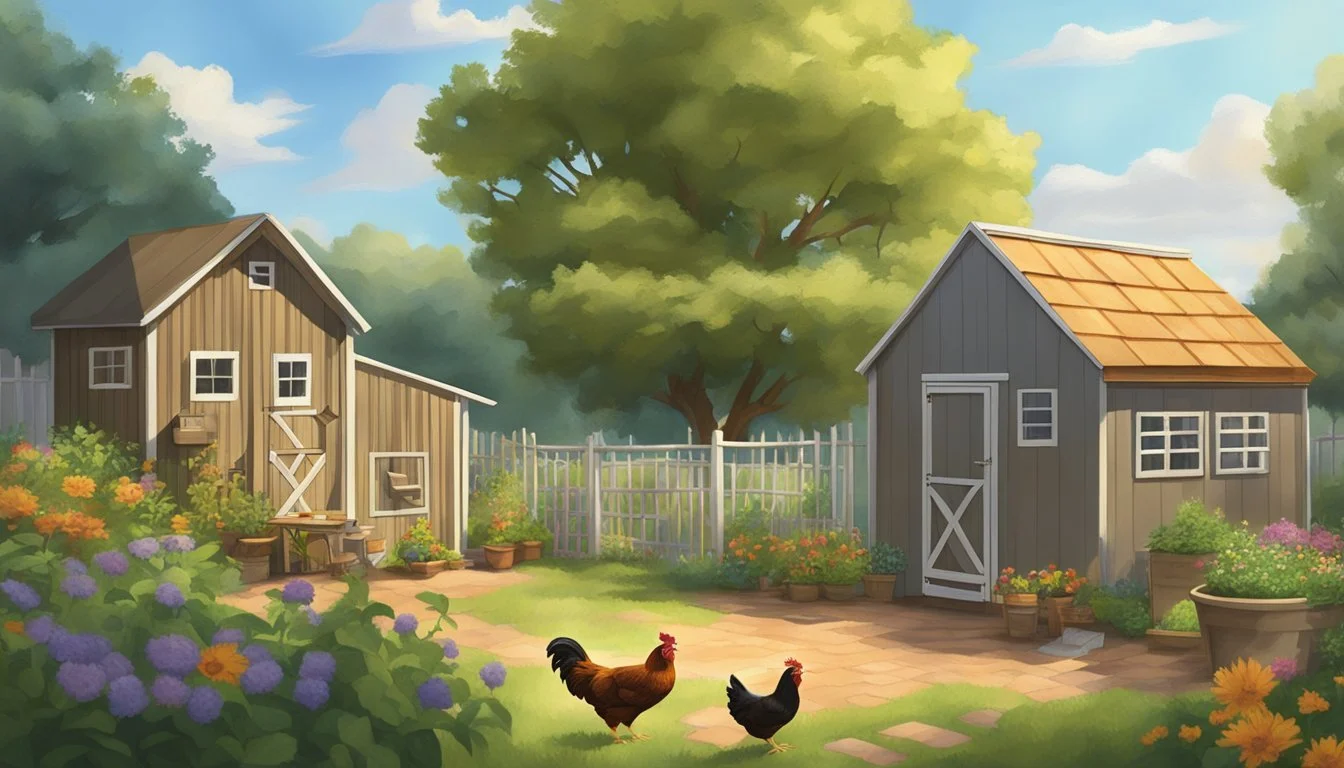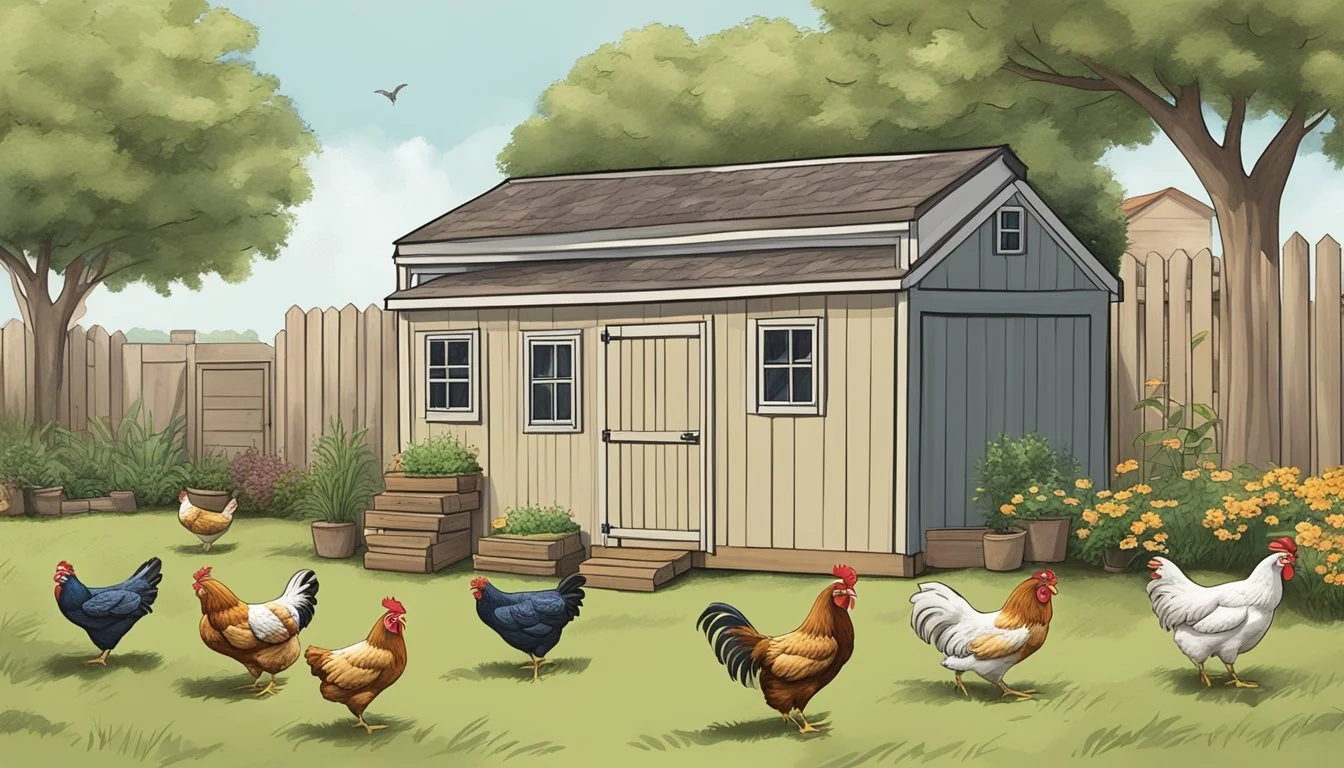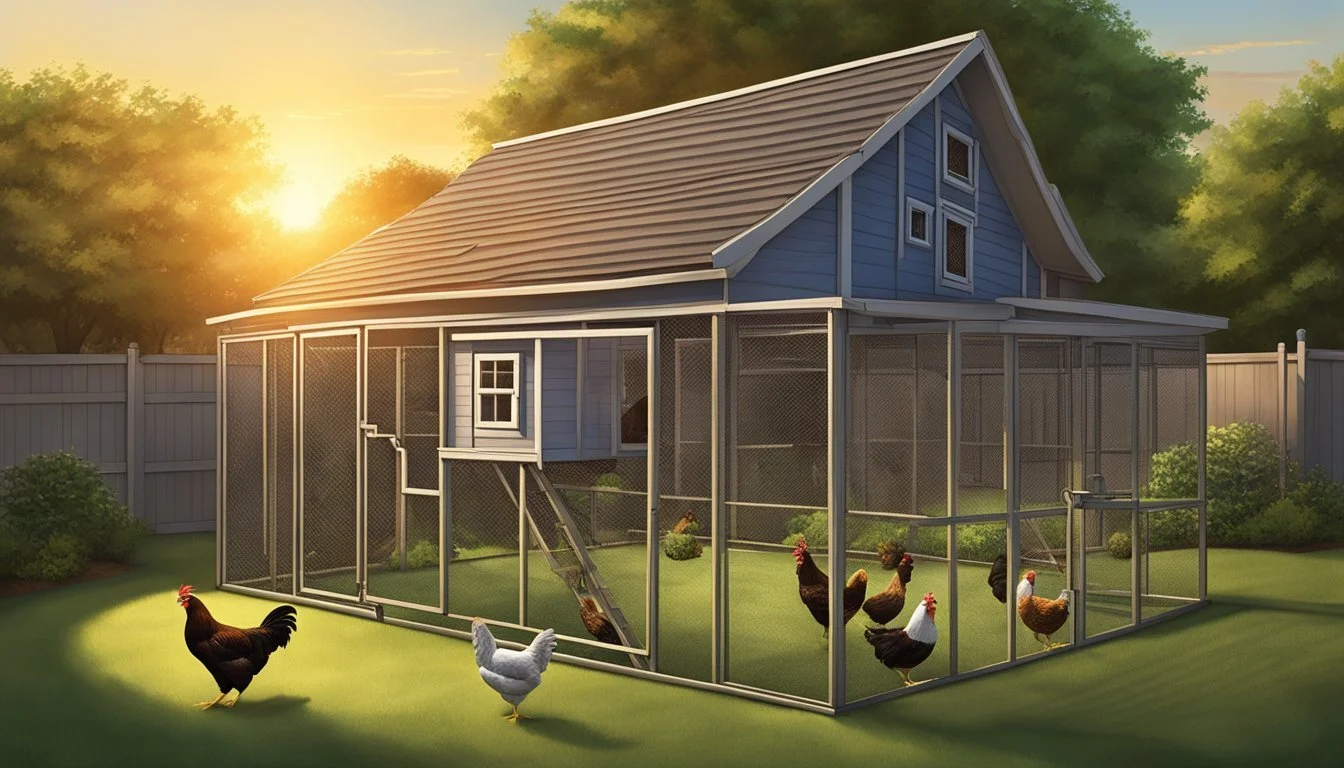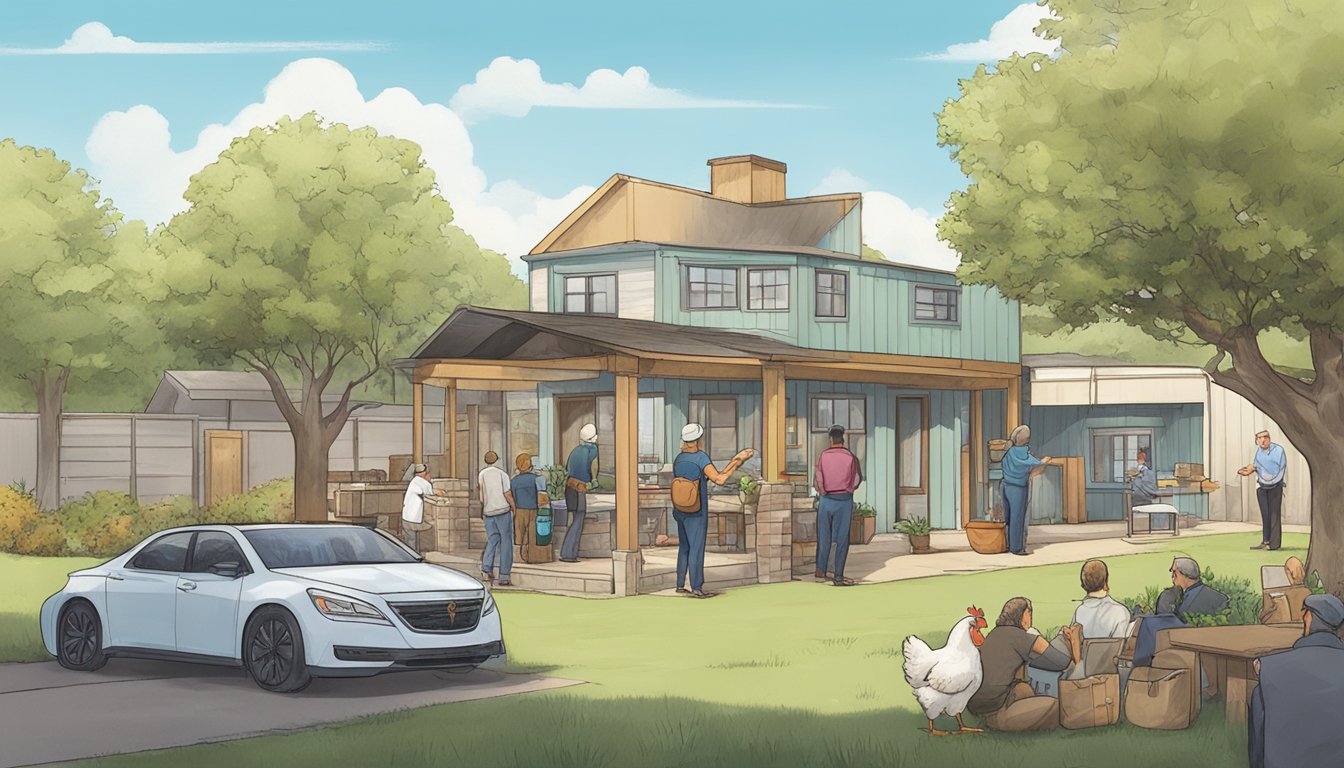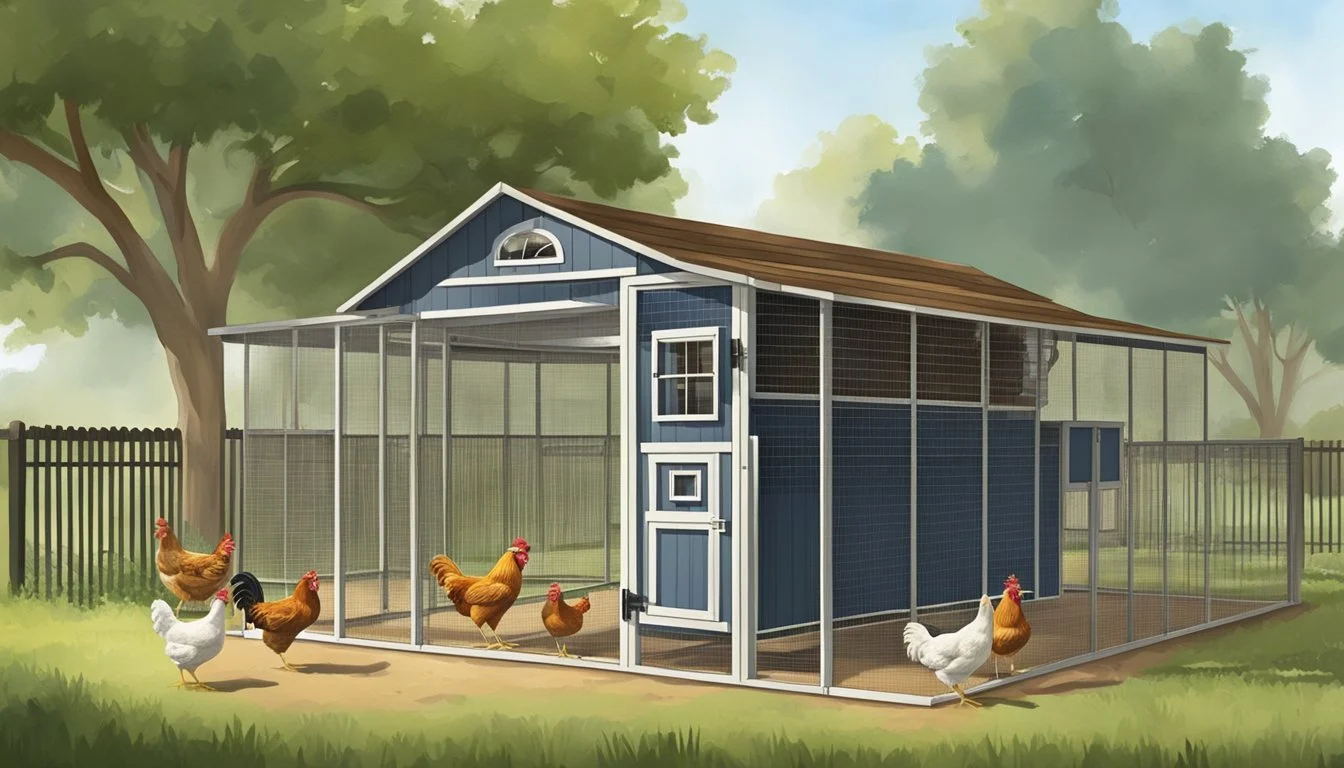Keeping Backyard Chickens in Fort Worth, TX
A Practical Guide for Urban Poultry Farmers
Raising backyard chickens has become a noteworthy trend in urban and suburban areas across the United States, and Fort Worth, Texas, is no exception. This pursuit merges the benefits of fresh eggs with the joy of keeping pets, and for many residents, it fosters a closer connection to their food sources. Fort Worth's city ordinances reflect a balance between allowing the practice of keeping backyard chickens and maintaining urban order, public health, and neighborly consideration.
In the city of Fort Worth, individuals are permitted to own chickens, but they must adhere to specific regulations that have been put in place to ensure the well-being of both the animals and the community. For instance, chickens must be housed in a fully enclosed coop or pen. These structures need to be at least 50 feet away from any regulated structure, encompassing houses, schools, restaurants, and other public buildings. Moreover, coops are required to be designed specifically for housing animals, ensuring that the chickens have a safe and suitable living environment.
Local chicken laws may change over time; therefore, residents interested in keeping backyard chickens are advised to review the most current version of the City of Fort Worth Code of Ordinances or consult with local authorities for any updates. This ensures compliance with city regulations and supports the harmonious integration of backyard chicken-keeping within the Fort Worth community.
Overview of Backyard Chicken Ordinances in Fort Worth
In Fort Worth, Texas, residents may keep chickens on their properties, adhering to specific local ordinances. These ordinances are designed to maintain public health and safety, while also considering animal welfare.
Zoning plays a crucial role in determining the number of chickens allowed. For properties one-half acre or smaller, the limit is 12 fowl, which can include, but is not limited to, a maximum of two roosters. For those with larger properties, exceeding one-half acre but less than one acre, up to 25 fowl are permitted. In every case, all fowl must be housed in a coop or pen.
Regulations stipulate that coops or pens must be positioned at least 50 feet away from neighboring residential structures. This includes homes, as well as public buildings such as schools and restaurants. The housing must be explicitly designed to accommodate animals and ensure that chickens do not roam free-range.
A permit is typically not required for keeping chickens within the set limits, but residents should verify with the City of Fort Worth for the most up-to-date information and to ensure compliance with all ordinances.
It is imperative that anyone considering raising chickens in Fort Worth familiarizes themselves with these local ordinances. The City of Fort Worth's chicken ordinance aims to balance the needs of the residents with keeping the community safe and nuisance-free.
Setting Up Your Chicken Coop or Pen
Creating a suitable habitat for backyard chickens in Fort Worth involves understanding specific regulations regarding structure, location, and maintenance.
Defining a Regulated Structure
In Fort Worth, a regulated structure pertains to any building that must adhere to city codes, such as houses, schools, and restaurants. For chicken owners, this means ensuring the coop or pen meets local requirements for keeping poultry.
Coop Restrictions and Requirements
Chicken coops or pens must be fully enclosed to prevent birds from free-ranging. They should offer sufficient protection and are required to be designed specifically for keeping animals. Maintenance and cleanliness are vital to avoid pest infestations and diseases.
Property Size and Distance Regulations
Owners must consider both property size and local distance regulations:
Properties one acre or larger: May house up to 50 fowl with a maximum of two roosters.
Distance requirements: Coops or pens must be at a minimum of 50 feet from regulated structures.
Safety and Health Guidelines
Safety and health are paramount when setting up a chicken coop or pen:
Waste Management: Regular cleaning to control waste and odor.
Secure Enclosure: Protection from predators to ensure the safety of the chickens.
Health Checks: Routine inspections to monitor the well-being of the chickens.
Understanding Zoning and Property Covenants
When considering the venture of raising backyard chickens in Fort Worth, Texas, homeowners must navigate through the specifics of the zoning laws and adhere to property covenants that may apply.
Zoning Laws Specific to Fort Worth
In Fort Worth, the city zoning laws permit the keeping of chickens with certain constraints based on the size of the property. For instance, properties one acre or larger may keep up to 50 fowl, with a restriction of no more than two roosters. The regulations are designed to minimize disturbances, such as noise and smell, to neighboring properties. Coops or pens are required for the fowl and must be situated at least 50 feet from any neighboring residence.
Permit Required: No
City and County Contacts for reference:
City: Fort Worth Code Officer: East District
Location: 818 Missouri Avenue
Supervisor: Mike Camp
Phone: 817-995-1297
Dealing with Homeowners Association Restrictions
Residents must also consider the role their Homeowners Association (HOA) plays regarding backyard chickens. HOAs may enforce covenants with stricter rules than the city or county. It's crucial for residents to review their HOA guidelines, as these rules are legally binding and might impose additional restrictions such as the complete ban of poultry, specific coop aesthetics, or additional setback requirements.
Key points:
Check local zoning laws.
Review HOA covenants for additional restrictions.
Compliance with both city and community regulations is essential.
Obtaining Necessary Permits and Compliance
Before one can keep backyard chickens in Fort Worth, Texas, they must obtain the appropriate permit and understand the compliance requirements to avoid penalties.
Application for Backyard Chicken Permit
Residents of Fort Worth who wish to raise chickens in their backyard must first apply for a permit. This process is regulated by the city's local ordinances to ensure public health and safety. The application must be submitted to the Fort Worth Code Compliance department, which oversees the issuance of permits. It is critical for applicants to provide accurate information about their coop plans and acknowledge the ordinance requirements, such as coop placement and the number of chickens allowed.
Fees, Fines, and Penalties for Non-Compliance
The City of Fort Worth levies certain fees for the permit processing and periodically updates these costs. Residents should consult the most current fee schedule to determine the exact amount due at the time of application. Once the permit is granted, any failure to comply with the city's chicken ordinances can result in fines or penalties. Violations include improper coop construction, exceeding the number of chickens allowed, and failing to maintain a clean and safe environment for the birds. The city has the authority to impose fines and, in severe cases, revoke permits if repeated violations occur. It is therefore paramount that residents adhere strictly to all regulations to avoid these penalties.
Local Regulations and Restrictions
In Fort Worth, Texas, specific rules apply to the keeping of backyard chickens, ensuring harmony between urban farming practices and neighborhood living.
Restrictions on the Number of Chickens and Roosters Allowed
Fort Worth permits its residents to keep chickens on their property, but there are limits.
Properties smaller than one half-acre can maintain fewer chickens, and typically only a limited number of roosters are allowed, often to minimize noise.
For properties larger than one half-acre but less than one acre, residents may keep up to 25 fowl, but are restricted to a maximum of two roosters.
The aim is to balance agricultural interests with residential peace.
Proximity to Schools, Churches, and Neighboring Residences
Local ordinances in Fort Worth establish clear boundaries for how close chicken coops can be to public buildings and neighboring homes.
Chicken coops or pens must be positioned at least 50 feet away from any regulated structures, which includes houses, schools, churches, and other public establishments.
A coop must also be fully enclosed and designed specifically for housing animals to avoid any potential conflicts with neighbors or issues with local wildlife.
These measures are in place to ensure minimal disruption and health and safety compliance within the community.
Proper Management and Care for Backyard Chickens
Proper management and care are crucial for the health and safety of backyard chickens in Fort Worth, TX. Owners should focus on health, cleanliness, and protection measures to ensure their fowl thrives.
Health, Nutrition and Veterinary Care
Chickens require a balanced diet, rich in proteins, vitamins, and minerals. A majority of their nutrition should come from a high-quality commercial poultry feed supplemented with grains like corn or wheat, and calcium sources for eggshell production. Fresh water access daily is critical for their health. Regular veterinary check-ups are advised to prevent and treat common poultry diseases.
Cleaning and Waste Management
Coops and pens must be kept clean to prevent disease. A routine should be established for:
Daily:
Remove feces from the coop.
Check for soiled bedding.
Weekly:
Replace dirty bedding.
Clean feeders and waterers.
Monthly:
Conduct a thorough cleaning of the entire coop.
Proper waste management includes composting chicken manure or disposing of it safely, keeping in mind local regulations.
Protecting Chickens from Predators and Disease
Chickens need protection from predators and diseases. The following measures should be taken:
Secure the coop with hardware cloth instead of chicken wire to deter predators.
Ensure the coop is locked at night.
Practice biosecurity by:
Limiting visitor access to your poultry.
Quarantining new birds for 30 days.
Vaccinate the flock as per local veterinary recommendations.
Legal Considerations and Resources
When raising backyard chickens in Fort Worth, Texas, it is essential to be aware of specific regulations that apply within city limits. Adhering to these rules will ensure that chicken owners are in compliance with local law.
Fort Worth, Texas Chicken Ordinances
City Ordinances: Fort Worth requires that chickens must be contained in a coop or pen and must be kept at least 50 feet away from any regulated structures, including houses, schools, and hospitals. Coops or pens need to be enclosed to prevent chickens from roaming freely.
Contact for Information: For the most accurate and up-to-date information regarding backyard chicken ordinances in Fort Worth, individuals should contact the City of Fort Worth Code Compliance Department.
Information Last Updated: The last known update regarding chicken regulations was provided by local sources in October 2019. However, checking with the City of Fort Worth is recommended for the latest updates.
Link for More Information: City of Fort Worth Backyard Chicken Ordinances
State Law vs. Local Ordinances
Texas State Law and Local Ordinances: Texas does not have specific statewide ordinances that regulate the keeping of backyard chickens, leaving it to cities and municipalities to set their own rules.
Local Precedence: While Texas state law offers a degree of freedom, local ordinances take precedence and provide specific guidelines that must be followed within given localities.
Additional Information: To avoid conflicts, chicken owners in Fort Worth should ensure local regulations are met, even if state law is less stringent.
Regulated Animals: The term "regulated animals" typically refers to animals that are subject to city ordinances, including backyard chickens.
It is the responsibility of Fort Worth residents to familiarize themselves with these legal considerations and to regularly consult local resources to remain informed about any changes to city or state laws regarding backyard poultry.
Community Engagement and Education
Raising backyard chickens in Fort Worth not only promotes self-sufficiency among homeowners but also fosters a sense of community through shared knowledge and resources.
Benefits of Raising Chickens in the Community
Raising chickens in a community setting yields numerous benefits. It provides an opportunity for self-sufficiency as families can produce their own eggs. This practice often leads to surplus eggs, which can be shared with neighbors, strengthening community bonds. The presence of chickens in the community also facilitates educational opportunities for all ages, as residents learn about animal care, sustainability, and local food production.
Fosters Self-Sufficiency: Residents gain hands-on experience in food production.
Encourages Sharing: Extra egg production often leads to sharing amongst neighbors.
Educates Residents: Community members, especially children in schools, learn about sustainability.
Local Workshops and Education Programs
Fort Worth provides various local workshops and education programs that aim to enhance the knowledge and skills of residents in raising chickens. These programs offer guidance on best practices for chicken care, coop construction, and adherence to local guidelines, which often include maintaining a certain distance from neighboring properties and following homeowners association regulations.
Workshops: Regularly scheduled sessions cover a range of topics from coop building to chicken health.
Education Programs: Schools and community centers provide programs geared towards increasing awareness of local food systems.
Online Forums: Members of online chicken forums often share advice, creating an accessible platform for education and support.
Local authorities and chicken enthusiasts host these educational initiatives, fostering an informed and engaged chicken-raising community.

